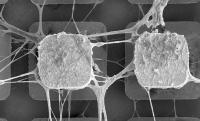Nhranaghacon
Banned
Stem Cell AI - Brain on A Chip
Long Read, more at the link provided

Scientists have started work on a project that will see human brain stem cells used to power artificial
intelligence (AI) devices and bring about a revolution in computing.
The Neu-ChiP project, an international collaboration led by researchers at Aston University, has been
awarded €3.5m (£3.06m) to show how neurons - the brain's information processors - can be harnessed
to supercharge computers' ability to learn while dramatically cutting energy use.
The research team is now embarking on a three-year study to demonstrate how human brain stem
cells grown on a microchip can be taught to solve problems from data, laying the foundations for a
"paradigm shift" in machine learning technology.
Use of AI is becoming ever more prevalent in areas as diverse as healthcare, finance, autonomous vehicles
and speech recognition, right through to recommending films through on-demand services like Netflix. The
'big four' tech companies - Apple, Google, Amazon and Facebook - and many others are investing heavily in
machine learning to tailor their products and better understand their customers.
But current electronic approaches to machine learning have limits, requiring ever-growing computing power
and high energy demands. The recent trend towards 'neuromorphic computing', which aims to mimic human
neural activity electronically, is hampered by the inherent limitations of conventional electronics.
In contrast, human brain cells effortlessly combine these functions and have extremely low power demands,
requiring only a small volume of a nutrient-rich solution to operate.
In the Neu-ChiP project, the team will layer networks of stem cells resembling the human cortex onto microchips.
They will then stimulate the cells by firing changing patterns of light beams at them. Sophisticated 3D computer
modelling will allow them to observe any changes the cells undergo, to see how adaptable they are. This imita-
tes the 'plasticity' of the human brain, which can rapidly adapt to new information.
Long Read, more at the link provided
Stem cell AI -- 'brain on a chip' project aims to revolutionize computing power
Scientists have started work on a project that will see human brain stem cells used to power artificial intelligence (AI) devices and bring about a revolution in computing. The Neu-ChiP project, an international collaboration led by researchers at Aston University, has been awarded €3.5m...
www.eurekalert.org
Scientists have started work on a project that will see human brain stem cells used to power artificial
intelligence (AI) devices and bring about a revolution in computing.
The Neu-ChiP project, an international collaboration led by researchers at Aston University, has been
awarded €3.5m (£3.06m) to show how neurons - the brain's information processors - can be harnessed
to supercharge computers' ability to learn while dramatically cutting energy use.
The research team is now embarking on a three-year study to demonstrate how human brain stem
cells grown on a microchip can be taught to solve problems from data, laying the foundations for a
"paradigm shift" in machine learning technology.
Use of AI is becoming ever more prevalent in areas as diverse as healthcare, finance, autonomous vehicles
and speech recognition, right through to recommending films through on-demand services like Netflix. The
'big four' tech companies - Apple, Google, Amazon and Facebook - and many others are investing heavily in
machine learning to tailor their products and better understand their customers.
But current electronic approaches to machine learning have limits, requiring ever-growing computing power
and high energy demands. The recent trend towards 'neuromorphic computing', which aims to mimic human
neural activity electronically, is hampered by the inherent limitations of conventional electronics.
In contrast, human brain cells effortlessly combine these functions and have extremely low power demands,
requiring only a small volume of a nutrient-rich solution to operate.
In the Neu-ChiP project, the team will layer networks of stem cells resembling the human cortex onto microchips.
They will then stimulate the cells by firing changing patterns of light beams at them. Sophisticated 3D computer
modelling will allow them to observe any changes the cells undergo, to see how adaptable they are. This imita-
tes the 'plasticity' of the human brain, which can rapidly adapt to new information.
